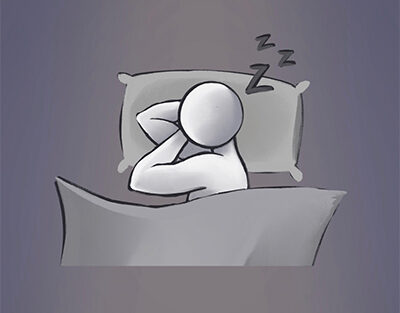Are you one of the lucky people who fall asleep as soon as your head hits the pillow, or do you toss and turn endlessly before falling asleep? If you’re the latter stick around and learn some helpful tips that will help you catch some z’s before you know it!
Did you know that 1 in 4 people experience difficulty sleeping? This doesn’t just mean that they can’t fall asleep, it also includes trouble staying asleep, waking up early, daytime sleepiness, sleeping too much or having restless sleep.
The Importance of Sleep
Having adequate and restful sleep is important for your physical and mental health. Sleep is an essential function that allows you to recharge and stay alert, without it you have trouble concentrating, thinking clearly and processing memories. Lack of sleep has also been linked to a higher risk of developing certain diseases and conditions including obesity, type 2 diabetes, high blood pressure, heart disease, stroke, and poor mental health.
The Science of Sleep
The average adult needs 7-9 hours of sleep per day. We have an internal ‘body clock’ that controls our sleep cycle and runs on a 24-hour circadian rhythm. After we wake up, we get increasingly tired as the day goes on until we reach our peak tiredness at bedtime. This rhythm is affected by many things including hormones and light.
There are 4 stages that we cycle though as we sleep, the first 3 stages involve non-rapid eye movements. The first stage is light sleep and is the transition phase between being awake and asleep. This is when we relax and our body beings to slow down. Our heart rate, breathing rate, brain waves and eye movement activity decreases. This should last several minutes.
As we enter stage 2 or deep sleep, our bodily processes continue to slow down, and our temperature will decrease. This should be the longest of the four stages in our sleep cycle.
The third stage is what sets us up to feel refreshed and alert the next day, this is the stage that our body will be at its most relaxed.
The fourth and final stage in our cycle is our rapid eye-movement stage. Our heart rate, breathing rate, blood pressure and eye movements all start to increase in activity. This is the stage that dreaming takes place.
We cycle through these 4 stages repeatedly through the night until we wake up. Each stage lasts between 90-120 minutes.
Now that we know more about sleep and why it’s so important let’s talk about sleep hygiene.
Sleep Hygiene
Sleep hygiene includes our environment as well as our habits and improving both aspects can lead to higher-quality sleep.
Here is a list of ideas to help you start improving your sleep hygiene.
- Create a comfortable sleep environment. This includes a supportive mattress and pillow, comfortable bedding and room temperature, minimal noise, and light. Light scents like lavender can also create a calming state for sleep.
- Creating a relaxing routine before going to bed can help you fall asleep more easily. Figure out what puts you in a calm state of mind and do this before bed. This can include listening to music, reading a book, stretching, meditating, etc. Limiting bright lights and electronics during this time will help increase the production of melatonin and decrease mental stimulation.
- Keeping a consistent routine will give your body clues that’s it time for bed. This can be as simple as putting on pajamas, having a cup of tea and brushing your teeth. Doing this around the same time every night is important as well. This consistency should continue into your morning routine, waking up at the same time everyday helps create a regular sleep cycle.
- Do not stay in bed tossing and turning hoping that sleep will find you! Get out of bed if you don’t fall asleep within 20-30 minutes. Try your relaxing night routine again and then get back in bed when you become tired.
What can you do during the day that will help you sleep better at night?
- Being active! Something as simple as going for a walk, especially in the afternoon or early evening can lead to more restful sleep.
- Avoid caffeine, alcohol and smoking within 4 hours of bedtime.
- Limit napping as this will interfere with your 24-hour sleep cycle.
- Restrict bed use for sleeping. Watching tv, reading, working, studying etc. keeps your mind active and will get in the way of sleep.
- Getting natural light throughout the day helps set your bodies internal clock.
It isn’t required that you follow everything on this list but starting small and being consistent will help you build healthy sleep habits that will pay off in the long run. Be patient with yourself and remember that stressing about sleep doesn’t help you sleep!






